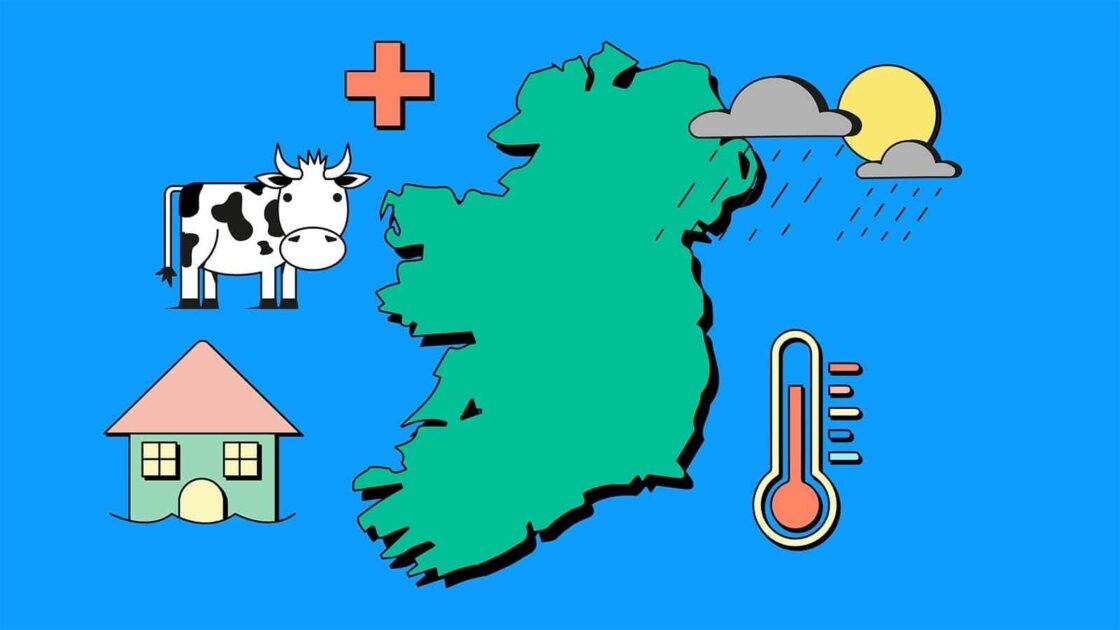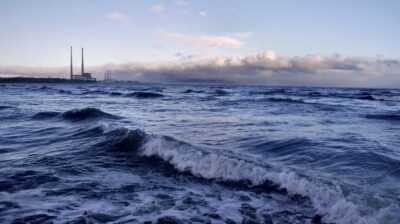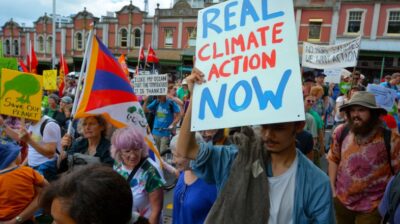How does climate change affect Ireland?
Do you know life in Ireland could be impacted by climate change?

Ireland is not at all immune to the impacts of climate change. We have already started to experience some of the effects, but as time goes on, the impacts of climate change in our country will become more severe.
We are an island surrounded by water, making us vulnerable to coastal erosion and sea level rise, which will change the landscape of our coastal towns and force people to move. Even now we are experiencing unusual weather events, a sign that we have already begun to see the effects of climate change in Ireland.
How will climate change affect Ireland?
There are some projections as to how Ireland’s climate could change over the next number of years, and talking about these changes can help us to understand why the climate emergency is such a big issue that needs to be addressed immediately.
Sea level rise and coastal flooding
An increase in ocean temperatures has caused oceans to expand, because water expands when heated (this is known as thermal expansion). The ocean absorbs a lot of the global warming that we’re causing, which speeds up that thermal expansion. This is one of the main causes of sea level rise, which poses a serious threat to coastal towns in Ireland.
More than 50% of Ireland’s population is along the coast, in both towns and major cities. Climate change has caused coastal erosion, when the sea takes up more and more of the land, and this is expected to cause an increase in coastal flooding. The erosion of the coast also means that over time we will have to retreat further inwards, forcing a significant number of people to relocate within Ireland.
If sea levels continue to rise, experts predict that cities and towns built in low-lying coastal areas like Cork, Dublin, Galway, Wexford and Limerick will be most at risk.
Rainfall and flooding
Between 1981 and 2010, the average national rainfall rose by 5% compared to 1961 to 1990. The largest amounts of rainfall have been in the West. According to the EPA, as the climate continues to change, we are expected to see a big reduction in the annual levels of rainfall during spring and summer – but a big increase in heavy rainfall in winter and autumn, likely resulting in wetter winters. These changes in rainfall patterns will have an impact on our farming and agricultural systems.
More torrential downpours can lead to flooding and other extreme weather events. This can damage property and force people to move, impacting on livelihoods and communities.
Temperature changes
Ireland is known for cold, wet weather, so one of the more obvious signs of climate change affecting Ireland is its changing weather conditions. Between 1890 and 2008, the average temperature in Ireland rose 0.7 degrees Celsius. Average temperatures over the last five years and the last ten years have been the warmest on record.
Although climate change will result in more torrential downpours of rain, especially during winter, at the same time we can likely expect more droughts during the summer as more heatwaves and more dry spells take hold. This will impact on the agricultural industry, leading to failed harvests. It can also affect our drinking water supply and lead to water shortages.
Food security
The risk of increased rainfall in the winter and drought in the summer can cause big food security problems, for both our agricultural industries at home and abroad. We import a lot of our food, but if farmers in other EU countries and beyond continue to experience extreme weather events like flooding and drought, their crops will fail and we could experience food shortages.
Extreme weather events
Extreme weather events will become more intense as time goes on, and we will experience more of these events. The ocean holds most of the warming we are currently seeing, which greatly increases the likelihood of extreme weather events, such as hurricanes, occurring.
Extreme weather can threaten livelihoods, causing damage to property and causing injury, and events like heat waves could also be a threat to human health.
Health and wellbeing
Climate change causes a threat to our health and wellbeing. An increase in temperatures or more frequent heat waves could lead to more heat-related deaths and illnesses, and we could begin to experience more food and water-borne diseases.
Pollution and a decrease in air quality can also result in more respiratory illnesses, which is why we need to move away from the burning of fossil fuels as soon as possible.
Climate change can also cause a lot of stress and anxiety for many people. Climate change presents a lot of uncertainty about the future, and this can have a negative impact on our mental wellbeing. Learn more about how to handle climate anxiety.
What is Ireland doing about climate change?
As part of the Paris Climate Agreement and climate agreements with the European Union, Ireland has set a number of targets to cut the greenhouse gas emissions that are causing global warming. However, so far none of these targets have been met, and Ireland continues to be ranked as one of the worst countries in Europe for greenhouse gas emissions.
Read more about Ireland’s response to climate change here.
What can we do about climate change?
When it comes to taking action on climate change, we need to act now. This means pressuring our governments and corporations to take the necessary steps to reduce emissions, as outlined in the UN Paris Agreement.






